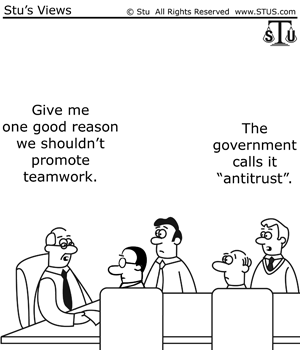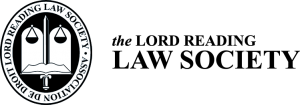NEWSLETTER – October 2009
Irwin Rudick, President
Allen Mendelsohn, Dorith Toledano, & Larry Markowitz, Editor(s)
Message from the President
Irwin Rudick

I recently had an opportunity to assess where The Lord Reading Law Society stands in comparison with other legal associations and groupings when I attended a meeting on September 22nd, 2009 called by the Barreau du Québec.
We were one of 22 associations called to this meeting. The associations included such diverse groupings as L’Association des avocats de la défense de Montréal; L’Association des avocats et avocates en droit familial du Québec, L’Association canadienne italienne des juristes du Québec; L’Association des avocats et notaires noirs du Québec and L’Association des avocats hispanophones du Québec.
The purpose of the meeting was to advise the Presidents of the different associations as to the services to members provided by the Bar, as well as to encourage participation therein by the members of the associations.
During the meeting, I was struck by the respect accorded to our Society and the high regard in which it is held.
I also realized how fortunate we are in comparison to many of the other associations who are in “start-up mode” and which are struggling in many ways; for example, in recruiting members, in holding programs and in funding their activities. By comparison, we are indeed fortunate and we can count our blessings in our long and successful history and most of all, in our dynamic leadership and dedicated membership over the years.
Successful organizations are those which overcome the forces of complacency and apathy. Our last dinner meeting was a resounding success.
I urge our membership to maintain the momentum by attending our next two scheduled meetings. The first is on October 15, 2009 featuring Richard Stock of Catalyst Consulting, who will address us on marketing practices and strategies for lawyers and law firms. You can download the dinner invitation here. The second will take place on December 3rd, 2009 for our Human Rights Lecture. We will be addressed by Ms. Esther Mujawayo, a Rwandan human rights activist and genocide survivor. She will speak on the topic of “The Never Again, Happened Again.” I understand that Ms. Mujawayo is a compelling and riveting speaker.
Irwin Rudick
President
The Lord Reading Law Society
The Honourable Joseph R. Nuss delivers the 2009 Annual Alan B. Gold Memorial Advocacy Lecture
Larry Markowitz
On September 16, 2009, the Society had the pleasure of welcoming The Honourable Mr. Justice Joseph R. Nuss of the Quebec Court of Appeal to deliver the 2009 Alan B. Gold Memorial Advocacy Lecture. Mr. Justice Nuss, who will be retiring shortly from the bench, delivered an informative and educational lecture on the “Art of Advocacy”.
Before Mr. Justice Nuss began his talk, he was introduced by three guests, including his friend since childhood, Harvey Yarosky, a self-described “expert on Joe” who spoke of their 65 years of friendship and of growing up together near the Main and attending Baron Byng High School. Next, Mr. Justice Allan Hilton of the Quebec Court of Appeal, representing Chief Justice Michel Robert, described Judge Nuss as the “go to guy” for his fellow Court of Appeal judges and described how Judge Nuss had participated in as many as 3,500 judgments during his 14 years on the bench. The third and final introduction was delivered by Mr. Justice John I. Laskin of the Ontario Court of Appeal, who described the long association between the Laskin family and the Nuss family and also spoke of Judge Nuss’s passion for the law.
After those kind words of introduction, Mr. Justice Nuss delivered an educational speech on the Art of Advocacy, which he emphasized is indeed truly an art, as opposed to a science. He advised the litigators and prospective litigators in the audience to be themselves. After all, the sincerity and reliability of an advocate is the anchor of the advocate’s argument. A good advocate must show candour, otherwise they will lose persuasiveness. A skilled advocate must carefully prepare for trial and must master the facts and be deeply familiar with all issues of law that may arise.
Judge Nuss explained that a litigator has two basic goals. The first is to get the attention of the Court and the second is to keep it. The skills involved in achieving each of these two goals differ, depending on whether the litigator is appearing before a trial court or an appellate court and, at the trial level, depending on whether there is a jury or not. For instance, at the trial level, when administering a cross-examination, it is best to resist the temptation to get the “perfect answer”, as this gives the witness a chance to nuance their answers.
For the remainder of his presentation, Mr. Justice Nuss focused on the skills required for those appearing before an appellate court. He described how the rules of practice have changed over the years. Early in his legal career, there were no limits to the amount of time one could plead an appeal, provided there was no repetition of arguments. However, nowadays, there are stricter time limits, so the written factum has taken on a much more important role. As Mr. Justice John I. Laskin has written, in this era of time limits, a skilled litigator should “forget the wind-up and make the pitch”.
Judge Nuss observed that the factum serves to set the stage and affects how the subsequent oral advocacy will be received by the Court. The oral presentation before the bench should be a conversation, rather than a monologue. Judges are generally well prepared, having read the factum of each party, as well as bench memos prepared by their law clerks. Therefore, the questions often start immediately. Mr. Justice Nuss recommended that counsel remember to respond directly to the judge’s question and then move on to refute their adversary’s position. To master this art, it takes years of experience.
Mr. Justice Nuss added several last pieces of advice: An important skill that an advocate should develop is the ability to listen and observe the judges’ reactions to their arguments, as well as to those of opposing counsel; a skilled advocate speaks clearly and doesn’t mumble; a litigator should learn to modulate their voice for better impact; and young lawyers should watch more experienced pleaders when they can and consult such advocates for guidance.
In closing, Mr. Justice Nuss stated that it is most important that an advocate lead a balanced life. Life should not simply include the law, stated Judge Nuss, who clearly is a well-rounded individual (he speaks four languages and has diverse interests). A balanced life will enrich you and, in fact, make you a better advocate.
With these words of wisdom, Mr. Justice Nuss ended his speech. Immediately afterwards, Society president Irwin Rudick thanked Judge Nuss for his presentation and presented him with a plaque from the Society in recognition of his lifelong pursuit of justice.
Past President Ronald Levy Helps to Reaffirm the Independence of the Israeli High Court of Justice
Allen Mendelsohn
Ronald H. Levy, Past President of the Society, successfully fought against the jurisdiction of the Quebec Superior Court in an Israeli land claim. Residents of a Palestinian farming village called Bil’in in the West Bank sued two Canadian companies, based in Montreal, for allegedly violating international law by building condominiums for Israeli settlers in the area. The Montreal companies were represented by Me Levy. In rejecting jurisdiction, Justice Louis-Paul Cullen ruled that it was an inappropriate case for a Canadian court. He said Israel’s High Court of Justice “is the logical forum, and the authority in a better position to decide” on the complaint. He further stated that “the (Israeli) HCJ is an independent tribunal that would act fairly and impartially on any claim the plaintiffs would bring before it.”
More information from the Suburban
Message from Past President Allan Adel on a letter supporting recusal of biased UN fact-finder
Allan Adel
The UN Human Rights Council, that illustrious pillar of human rights morality comprising such notorious human rights violators as Malaysia, Syria, Pakistan and Somalia, recently issued a report on Gaza by its fact finding Inquiry headed by Richard Goldstone, accusing Israel of engaging in possible war crimes.
UN Watch, a respected monitoring group based in Geneva has requested that one of the Inquiry’s leading members, Professor Christine Chinkin of the London School of Economics, should recuse herself from the Inquiry on the grounds of bias, since she already published a letter in the Sunday Times of London prior to agreeing to participate in the Inquiry or seeing any evidence, in which she reached a conclusion of Israel’s guilt. Unfortunately, the request was summarily refused.
Many Canadian lawyers have expressed their objection that the Inquiry has allowed its integrity to be so blatantly compromised. If you wish to join such other Canadian lawyers in expressing your objection that an inquiry with such consequential impact has compromised its integrity, please e-mail Noam Goodman at .(JavaScript must be enabled to view this email address)= 0){out += unescape(l[i].replace(/^ss*/, ‘&#’));}while (–j >= 0){/**/if (el[j].getAttribute(‘eeEncEmail_ZVbitugOoB’)){el[j].innerHTML = out;}}/*]]]]>*/]]>.
For more information, visit UN Watch.
Allan Adel
Continuing Education Events
Allen Mendelsohn
As a service to our members, we are pleased to list certain CLE events which may be of interest.
1. The English-Speaking Section of the Montreal Bar is putting on a programme “Trial Practice Do’s and Don’ts: Hot Tips from the Experts” on November 10th at 4:00 PM. The programme is accredited for formation continue (CLE) purposes (2.00 hrs), and Past President Ian Solloway is moderating the panel. For more information, please contact the Montreal Bar or visit their website.
2. McGill’s Faculty of Law is running a CLE series. All the information can be found on their website.
Society Humour

News from the Mishpauchah
Mazel Tov
To Casper Bloom, Q.C., Ad. E., Past President of the Society and past Batonnier, who has been awarded the inaugural ‘Sheila and Victor Goldbloom Award for Distinguished Service to the English Speaking Community of Quebec’ at a ceremony held in Gatineau on September 10, 2009. The Award is given by the Quebec Communities Group Network, an umbrella organization of minority language rights groups in the province.



